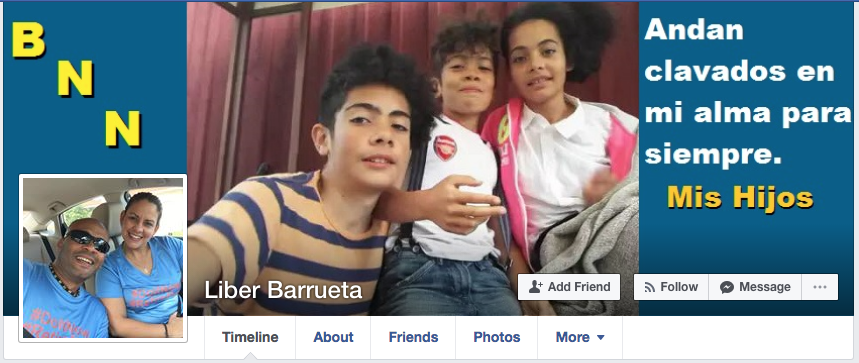
Regina Coyula, 26 September 2017 — It is an era of false news and Líber Barrueta, a Cuban-Swede based in Miami has a website of this fake news where he sarcastically refers to the way the press tackles the news. But neither the construction of an underground transport system in Havana, nor Tony Castro talking about the uniforms of the baseball team, nor even the new customs regulations that have been the subject of so much ink, have generated as much traffic for Líber as he has had in his personal account on the social networks between the days of the 9th and 10th of September.
Those were days Cubans will not easily forget. Irma would remind us of what a powerful hurricane is capable of. Líber, who has a large number of friends on Facebook, where he creates and shares motivational videos, began to share information on the weather phenomenon on his wall.
But the information was always delayed, waiting for the television or radio to say something. On seeing his updates, a friend residing in another state called him and recommended the Windy.com app, which allows you to follow the weather events in real time.
When he saw how complete the information was, Líber installed the app on his computer and on his phone and began to study it, because his knowledge of meteorology is that of any ordinary Cuban who has watched Doctor Jose Rubiera on television. Necessity led him to understand graphics, translation speeds, path models, and how to interpret the hectopascals (units of pressure); a five minute intensive and self-managed course of meteorology.
When Irma began her scourge over the territory of Cuba, Líber transmitted uninterruptedly for four hours supported by Windy and specialized bulletins. And this produced a reaction that illustrates the measure of the power of social networks: from different parts of the world, Cubans and foreigners began to interact on Líber’s wall, either to ask specific questions about the storm, to inquire about places and people threatened by the hurricane or to share images of the affected areas. From points as dissimilar as Scotland, Russia, Angola, and from Cuba itself, they went to Líber’s wall to construct, in this informal but detailed way, the vicissitudes of the event.
After a break he transmitted for four more hours, then slept a bit, and then transmitted for another two hours until he found himself without electricity or an internet connection. Maybe he did not have too many “thumbs up” (likes), because the moment was not for that, but he received more than 50,000 visits, 1,000 comments, and stopped counting after 300 private messages. New friend requests coming after this experience exceeded Facebook’s capacity for a personal account.
Still touched by the scare by the cyclone and the astonishment over the reception of his reports, this Bachelor in Education in the specialty of Philosophy and History, confesses that he had never felt a special interest in meteorology, other than living in an area marked by tropical cyclones, but after the extraordinary experience of Irma, which began with an eagerness to keep his friends at all latitudes informed with fresh and real information continuously updated for 10 hours, he has become motivated to know more about this subject. Líber is aware that many of those who visited his wall were not able to receive real-time information from Miami and much less from Cuba.
Líber Barrueta states that without the help of his partner Katya Moreira and without the support of her family it would have been impossible to report, comment, connect, answer, all at the same time at a frenetic pace. His mother-in-law, who at first did not understand what he was doing, became a collaborator. It does not matter that in the family they believed that, not being a specialist, it would not be possible to do it well. “People are used to it,” he says, “and this is a very widespread idea, that only what the traditional press publishes is valid, and that is the case in many countries. Little by little they understand that a vote of confidence must be given to the citizen.”
